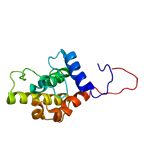Serum Assay Composed of Trio of Biomarkers May Help Detect Kidney Cancers
A new immunoassay that tests for the presence of nicotinamide N-methyltransferase (NNMT), L-plastin (LCP1), and nonmetastatic cells 1 protein (NM23A) may be an effective method for the early detection of malignant kidney cancer.
A new immunoassay that tests for the presence of nicotinamide N-methyltransferase (NNMT), L-plastin (LCP1), and nonmetastatic cells 1 protein (NM23A) may be an effective method for the early detection of malignant kidney cancer, according to the results of a study published recently in Cancer Epidemiology, Biomarkers & Prevention.

Structure of the LCP1 protein, one of the three biomarkers in the new immunoassay; source: Emw, Wikimedia Commons
Using this immunoassay, researchers were able to distinguish plasma samples from healthy control patients and those with kidney cancer. When the assay correctly identified 90% of samples from healthy controls, it was also able to correctly identify 94.4% of samples from patients with kidney cancer.
“If this biomarker is truly valid and accurate to detect renal cell carcinoma, a number of patients with renal cell carcinoma could potentially be saved through early diagnosis,” Nam Hoon Cho, MD, of the department of pathology at Yonsei University Health System in Seoul, Korea, said in a press release.
Cho and colleagues included 102 patients who were either healthy or had benign tumors and 87 patients with kidney cancer. They measured the concentrations of NNMT, LCP1, and NM23A in 189 plasma samples taken from these patients. The results indicated that all three of the biomarkers were highly elevated in patients with kidney cancer compared with healthy controls or patients with benign tumors:
• NNMT: 420 pg/mL vs 68 pg/mL; (P < .0001)
• LCP1: 13,789 pg/mL vs 10,348 pg/mL; (P < .0001)
• NM23A: 3,442 pg/mL vs 780 pg/mL; (P < .0001)
The researchers then tested an assay combining all three of these markers to see if healthy controls could be distinguished from patients with kidney cancer.
Based on the accurate results from the first analysis, the researchers then further validated the results in a group of 100 additional plasma samples taken from healthy controls (n = 73) and patients with kidney cancer (n = 23). The test accurately identified all of the samples from patients with kidney cancer.
Based on these results, the researchers concluded that the study warrants a multicenter study to validate the three-marker assay.